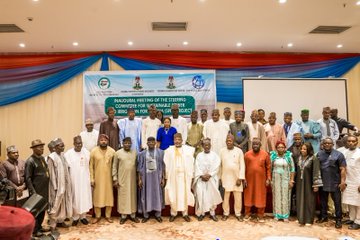The Federal Government has inaugurated the Steering Committee for the Sustainable Power and Irrigation in Nigeria (SPIN) project, a $500 million initiative aimed at enhancing irrigation systems, increasing hydropower generation, and improving food security across the country.
The committee, inaugurated on Thursday in Abuja, is chaired by the Minister of Water Resources and Sanitation, Prof. Joseph Terlumun Utsev, with the Minister of Power serving as co-chair. It comprises representatives from key federal ministries, state commissioners from participating states, and technical partners. The Permanent Secretary of the Ministry of Water Resources and Sanitation will serve as the secretary of the committee.

Speaking at the inauguration, Prof. Utsev stated that the SPIN project is a critical component of President Bola Ahmed Tinubu’s Renewed Hope Agenda, focusing on integrated water resource management, irrigation modernization, and sustainable energy development. He noted that the project builds upon the success of the Transforming Irrigation Management in Nigeria (TRIMING) project, which rehabilitated over 32,000 hectares of irrigation schemes and strengthened the capacities of Water User Associations (WUAs).
“With SPIN, we are scaling up these gains to irrigate up to 500,000 hectares of farmland, generate approximately 30 gigawatts of clean energy, and significantly strengthen our resilience to climate challenges such as droughts and floods,” the minister said.
Out of 34 states that indicated interest in participating in the project, only 17 met the eligibility requirements. These include enacting legislation to support WUAs, providing budgetary backing, and committing counterpart funds. The selected states will either collaborate with the federal government through River Basin Development Authorities (RBDAs) or implement state-managed irrigation projects.
The project is structured around four key components: institutional strengthening and reform, modernization of irrigation systems, dam safety and operational improvements, and effective project management. According to the ministry, it also includes measures to ensure sustainability, climate adaptation, and inclusion of local communities in its implementation.
Utsev commended the SPIN Interim Project Preparatory Team, which spent the last 15 months conducting field assessments, preparing technical documentation, and developing an 18-month implementation work plan. He emphasized that the formal launch of the Steering Committee marks the final stage before accessing the World Bank facility that will fund the project.
“This project will not only improve food production and energy access but also stimulate rural economies and create jobs, thereby contributing to national development and poverty reduction,” the minister added.
The SPIN project represents a strategic investment in Nigeria’s agricultural and energy sectors, aimed at boosting productivity, fostering resilience to climate change, and ensuring long-term food and energy security.